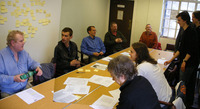May 24, 2007
Surfing on the Wave of Technology
 Cultural hitchhiking on the wave of advance of beneficial technologies -- Ackland et al. 104 (21): 8714 -- Proceedings of the National Academy of Sciences is a nice simulation paper of how the spread of a technology such as farming can create cultural boundaries.
Cultural hitchhiking on the wave of advance of beneficial technologies -- Ackland et al. 104 (21): 8714 -- Proceedings of the National Academy of Sciences is a nice simulation paper of how the spread of a technology such as farming can create cultural boundaries.
The basic model is that people with the technology will do better than people without it, so they will become more numerous and also diffuse. But people without the technology who are in contact with people who have it will tend to adopt it.
The paper looks at agriculture. Starting somewhere in the fertile crescent it spreads outwards as a wave, continuing until it reaches the limits of subsistence. Areas of low fertility such as mountain ranges act as temporary barriers slowing the spread.
The farmers in the remote regions are not descended from the same people as invented farming. At the start the wave is composed of the original farming people spreading outwards, driven by their higher fertility. They convert local hunter-gatherers but the converts get out-competed by the invaders anyway. But at some point the converts become numerous enough to stand on their own and the spread of the original farming people stops. This produces a cultural boundary where the spread of cultural memes hitchiking on the technology stops (and quite possibly a new set takes their place).
They have some nice movies showing the spread of the wave and the eventual "passing of the torch" to converts.
While this was geographically constrained it might be interesting to consider the same thing happening in social networks. Consider the Internet. Originally constrained to a culture of university people and technologists, it co-existed with various "hacker" memes such as tolerance and anti-authoritarianism (cf the Jargon File). Internet began to spread across social networks, giving various benefits. While people might not have become more fertile, the increased connectivity might have had a similar social network effect: they became more connected. The hacker memes were dragged along to some extent, until the Internet finally expanded enough to become independent of hacker culture (you did not need to become a hacker to understand or use it) and the hacker memes stopped spreading. I think cultural hitchiking is a pretty common phenomenon, and it might be fun modelling how it occurs in a purely memetic setting.
MTAS in the Breadqueue
This week on CNE I of course lambast the UK MTAS project. It is a grand disaster with all the classical components: government bodies not listening to early warnings, a drastic plan with no backup options, rushed software and massive public and specialist outcry. For those of you who can read Swedish my essay on hårdaretagism might be an interesting comparision.
May 14, 2007
Life Extension Scenarios
 Here are the results from the "Paths to life-extension" scenario planning project we did this sunday:
Here are the results from the "Paths to life-extension" scenario planning project we did this sunday:
The results of the brainstorming (Download file) as a mindmap and the scenarios (Download file). See also the bibliography.
The four scenarios are driven by the degree the public believes life extension is possible and how rapid progress is compared to this. In the boring scenario people don't believe in life extension, and the area also shows little progress - maybe because of lack of funding, maybe because it is too hard. In the surprise scenario the gradual accumulation of results lead to a rapid leap, shocking public opinion into action. In the nice scenario there is a great deal of interest in the progress of life extension, leading to a virtuous circle of investment and adaptation. And in the hype scenario life extension has been oversold and people are investing in a life extension bubble.
I think the main lesson from this small scenario exercise is that it matters how we promote life extension. It must not be oversold, and it must track real results - as well as anticipate near future progress. That is hard to do, both because future progress is hard to estimate (the paper gives some ideas for indicators) and because belief in that it matters and will come reasonably soon biases estimation, as well as the attention rewards for making extreme claims.
(this week's CNE Health blog is about a related matter, financial instruments for reducing uncertainties of life extension)
Life Extension Scenario Planning Bibliography
 Yesterday I held a ExtroBritannia scenario planning event with the theme of life extension. As a warm-up I did a quick survey of papers related to scenarios of life extension. Overall, I was surprised by the lack of good scenarios: this ought to be a great area to explore, but likely many researchers shy away from the imagined radicalness of life extension. That will likely change over the next years. Right now most people are making scenarios merely of current demographic trends, not willing to assume any effective life extension.
Yesterday I held a ExtroBritannia scenario planning event with the theme of life extension. As a warm-up I did a quick survey of papers related to scenarios of life extension. Overall, I was surprised by the lack of good scenarios: this ought to be a great area to explore, but likely many researchers shy away from the imagined radicalness of life extension. That will likely change over the next years. Right now most people are making scenarios merely of current demographic trends, not willing to assume any effective life extension.
Life Extension and Demographics
Jim Oeppen and James W. Vaupel, Broken Limits to Life Expectancy, Science 10 May 2002: Vol. 296. no. 5570, pp. 1029- 031
- A classic paper, showing how predictions of the maximum possible life expectancy has consistently failed - and the life expectancy has increased linearly over a long time, despite very different interventions.
Gregory B. Stock, The Pitfalls of Planning for Demographic Change, Ann. N.Y. Acad. Sci. 1019: 546-551 (2004).
- A warning about the enormous uncertainties introduced by life extension in predictions and planning for demographic change. This paper could on its own be used to generate scenarios, since it clearly states a number of key uncertaintites and driving forces. Makes the very sane observation that we should work on identifying and removing institutional rigidities that are not stable against demographic or longevity change.
Graziella Caselli, Jacques Vallin, Demographic Trends: Beyond the Limits?, Population: An English Selection, Vol. 13, No. 1, Biodemographic Perspectives on Human Longevity (2001), pp. 41-71
- A set of real demographic models of life extension, delayed childbearing and gender selection. Very interesting, only marred by the authors insistence of not taking the subject seriously.
Gillian Tett and Joanna Chung, Death and the salesmen, Financial Times, February 24 2007
- Article about how the insurance industry is trying to meet the uncertainities of mortality. Discusses mortality bonds, and the attempts to set up a longevity bond.
Many would 'want to live to 100', BBC News, Friday, 22 September 2006
- Britons are apparently willing to give up sex (40%), food and drink (39%) and travel (42%) in order to reach 100. But they are motivated by social factors like seeing grandchildren grow up.
Shaw F. Is the ageing population the problem it is made out to be? Foresight - The journal of future studies, strategic thinking and policy, Volume 4, Number 3, 2002, pp. 4-11(8)
- Contrarian paper that argues that many of the big worries linked to longevity, especially pensions and health-care, are not as serious as claimed. Instead the big issue is low nativity, and the longevity angle is biased due to various ideological agendas.
Turner L., Life Extension Technologies: Economic, Psychological, and Social Considerations, HEC Forum, Volume 15, Number 3, September 2003, pp. 258-273(16)
- Only looks at grounds for concern about life extension, not any positive sides.
Kevin G. Kinsella, Future Longevity: Demographic Concerns and Consequences, Journal of the American Geriatrics Society, Volume 53 Issue 9s Page S299 - September 2005
- Points out the irregularities in mortality decline and the reasons to consider life extension. Also mentions an UN study that extrapolates world population 300 years with various fertility estimates, yet does not include any different mortality or life extension models!
Donald B. Louria, Extraordinary Longevity: Individual and Societal Issues, Journal of the American Geriatrics Society 53 (9s), S317-S319 2005.
- Doom, gloom and bad stuff. Uses a systems model where every output of life extension is negative (bad environment, epidemics, lower quality of life, pension crisis etc). Shows the limit of systems models, in that the model does not take into account that people will actually try to solve the problems they encounter.
Dorothy P. Rice and Norman Fineman, Economic implications of increased longevity in the united states, Annual Review of Public Health. 25, pp. 457-473. 2004
- Lots of data and literature review; this could be regarded as the "no change" scenario of the next 30 years, not assuming any effective life extension.
Bruce C. Vladeck, Economic and Policy Implications of Improving Longevity, Journal of the American Geriatrics Society 53 (9s), S304-S307.
- Rather americentric, but with some good points about the drivers of longer work life, how US government expenditures change, the problems with suburbia and the important uncertainities about level of disabilty.
Scenario planning in general
Peter Schwartz, The Art of the Long View, Currency 1991.
Edward Cornish, Futuring: The Exploration of the Future, The World Future Society. 2005
- Very good bibliography.
Bradfield, Ron; Wright, George; Burt, George; Cairns, George; Van Der Heijden, Kees, The origins and evolution of scenario techniques in long range business planning. Futures, October, 37, 1-18, 2005
- History of scenario planning.
- A good example of scenario planning.
Ozcan Saritas; Michael Keenan, Broken promises and/or techno dreams? The future of health and social services in Europe, Foresight - The journal of future studies, strategic thinking and policy, Volume 6, Number 5, 2004, pp. 281-291(11)
- Scenarios of future healthcare.
Justman M.; Bezold C.; Rowley W.R., Genomics and society: four scenarios for 2015, Foresight - The journal of future studies, strategic thinking and policy, Volume 4, Number 4, 2002, pp. 29-36(8)
- Scenarios of genomics and genetic technology in society. See also this version.
http://en.wikipedia.org/wiki/Scenario_planning
- Contains two good "recipes" for scenario planning that can be used. I employed the post-it note approach yesterday, guided by the driving force selection methods in the military approach.
http://www.aleph.se/Projekt/Scenario/ (in Swedish)
- The world future scenarios by the Swedish Transhumanist Association. I'm pretty proud of them :-)
May 05, 2007
Norah's New Nose
 New Children's Book Helps Kids Deal With Pain And Isolation Of Plastic Surgery. A nice little story about how Norah gets a new nose so that Miss Moon will like her better.
New Children's Book Helps Kids Deal With Pain And Isolation Of Plastic Surgery. A nice little story about how Norah gets a new nose so that Miss Moon will like her better.
Of course, it is from The Onion. But despite the satire it brings up an interesting point: how do we present children with their automorphic and autotelic options?
Today we grow up being told that we are "good as we are" and that we should be ambitious, make something of ourselves. If we don't we will become failures - or worse, conformists. The exact bias of the mixture depends on which side of the Atlantic we grow up on, but we are sending mixed signals to the children. To some extent this is correct: an authentic life does not just consist of self-acceptance but also in self-overcoming, we should be loved for who we are yet respected for what we do, happiness comes from diverse sources and getting the right balance in life is hard and takes experience. But maybe we should actually try to explain this tension clearly to the kids rather than just foist advice onto them?
In particular we need to learn how to deal with the tricky concept that one can become better although one is already good. As David Zindell put it, "A thallow chick must break out of his egg, but this does not mean that the shell is without value." Maybe we really need a book "Self Transformation for Kids". A story about how Lissa The Butterfly changes from a butterfly into a beautiful betterfly.
May 03, 2007
Bias is Everywhere
This week on CNE I blog about the Maastricht mood enhancement workshop of the ENHANCE project I attended: Happy to be biased?. While this doesn't get into the really philosophically yummy stuff we discussed I think it is an important point to rememeber that bias is everywhere and people are smarter than we think.